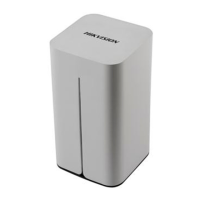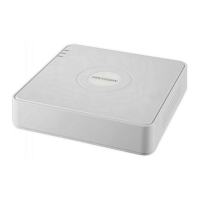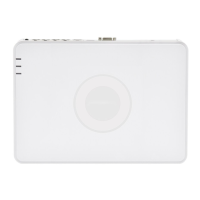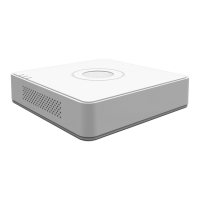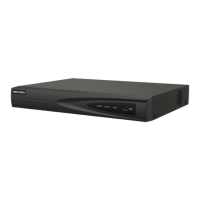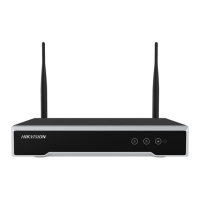Do you have a question about the HIKVISION DS-7116NI-SN/P and is the answer not in the manual?
| Number of users | 128 user(s) |
|---|---|
| Maximum resolution | 1920 x 1080 pixels |
| Video input channels | 4 channels |
| Supported resolutions | 1080P, UXGA, 720P, VGA, 4CIF, DCIF, 2CIF, CIF, QCIF |
| Audio RCA inputs | 1 |
| USB 2.0 ports quantity | 2 |
| Ethernet LAN data rates | 10, 100 Mbit/s |
| Power over Ethernet (PoE) | Yes |
| Copper ethernet cabling technology | 10BASE-T, 100BASE-T |
| Power over Ethernet (PoE) ports quantity | 4 |
| HDD capacity | - GB |
| HDD interface | Serial ATA |
| Maximum storage capacity | 4 TB |
| Number of HDDs installed | 0 |
| Output voltage | 48 V |
| Power consumption (max) | 35 W |
| Power consumption (typical) | 6 W |
| Product color | White |
| Rack capacity | 1U |
| Operating temperature (T-T) | -10 - 55 °C |
| Operating relative humidity (H-H) | 10 - 90 % |
| Wi-Fi | No |
| Depth | 205 mm |
|---|---|
| Width | 255 mm |
| Height | 45 mm |
| Weight | 1000 g |
Details FCC compliance requirements for digital devices.
Outlines compliance with European directives for product safety and environmental impact.
Highlights critical safety warnings and precautions to prevent injury or damage.
Provides essential tips for proper installation and safe operation to prevent damage or hazards.
Describes the general capabilities and connectivity options of the Network Video Recorder.
Details features for on-site viewing and management of video streams.
Covers storage management, including disk connectivity and capacity.
Explains recording modes, schedules, and playback functionalities.
Outlines the network interfaces and protocols supported by the NVR.
Describes the buttons, indicators, and ports on the front of the NVR.
Explains how to use the infrared remote control for device operation.
Details how to use a USB mouse for navigating and controlling the NVR interface.
Explains the input methods available on the NVR's interface.
Illustrates and describes the connectivity ports on the rear of the NVR.
Provides instructions for powering the NVR on and off correctly to ensure device longevity.
Guides users through setting a strong administrator password for initial device activation and security.
Explains how to use the setup wizard for essential initial NVR configurations like date, time, and network.
Describes the procedures for logging into and out of the NVR system for secure access.
Details the process of adding and connecting IP cameras to the NVR for video recording.
Explains the live view function, showing real-time video from connected cameras.
Covers various operations like single/multi-screen display, auto-switch, and starting recording.
Details how to customize live view parameters such as output interface, dwell time, and audio.
Explains how to configure parameters for Pan, Tilt, and Zoom (PTZ) camera control.
Guides on setting camera positions (presets), movement paths (patrols), and recorded movements (patterns).
Describes the interface and controls for operating PTZ cameras.
Allows defining parameters affecting image quality, stream type, and resolution for recording.
Enables setting a schedule for automatic camera recording based on time and events.
Sets up motion detection parameters to trigger recording and other actions upon detecting movement.
Configures recording to start automatically when an alarm input is triggered.
Sets up recording based on Video Content Analysis (VCA) alarms detected by compatible cameras.
Allows users to manually start and stop recording, overriding scheduled recordings.
Enables saving recordings simultaneously to two HDDs for enhanced data safety and reliability.
Allows grouping HDDs to manage storage for recordings from specific channels.
Describes methods to protect recorded files from being overwritten, either by locking or setting HDD to read-only.
Covers methods for playing back recorded video files by channel, time, or event search.
Includes features like frame-by-frame playback, digital zoom, and multi-channel reverse playback.
Details procedures for exporting record files to backup devices like USB drives or SATA writers.
Covers managing backup media, including creating folders, deleting files, formatting, and checking export results.
Configures motion detection parameters and sets alarm response actions.
Allows setting handling actions for external sensor alarms.
Configures the NVR to detect video loss from a channel and take response actions.
Sets up video tampering detection and associated alarm response actions.
Configures handling of VCA alarms from compatible IP cameras.
Manages response actions for various system exceptions like HDD full or network disconnection.
Defines how the system responds to alarms, including event hints, full-screen monitoring, and audible warnings.
Allows manual triggering or clearing of alarm outputs for testing or specific situations.
Sets up fundamental network parameters like IP address, subnet mask, and DNS server.
Covers advanced network features such as EZVIZ Cloud P2P, DDNS, PPPoE, NTP, SNMP, and NAT.
Allows monitoring real-time network traffic, including linking status and bandwidth usage.
Provides tools for testing network delay, packet loss, and exporting network data packets.
Guides on initializing newly installed hard disk drives before they can be used by the NVR.
Covers adding and configuring NAS or IP SAN disks as network HDDs for expanded storage.
Explains how to group multiple HDDs for organized storage and recording management.
Allows setting specific storage quotas for recorded files per camera, managing disk space efficiently.
Provides methods to check the operational status of installed HDDs for maintenance and failure detection.
Details functions for detecting HDD health using S.M.A.R.T. and bad sector scanning.
Configures the NVR to generate alarms for HDD errors or abnormal status.
Allows customizing On-Screen Display settings like date, time, and camera names on the video feed.
Enables setting privacy zones to obscure specific areas in the video feed from viewing or recording.
Covers adjusting image parameters such as brightness, contrast, and saturation for cameras.
Provides access to view device, camera, record, alarm, network, and HDD system information.
Details how to search, view, and export system log files for troubleshooting and auditing.
Allows exporting and importing IP camera configuration data, facilitating backup and deployment.
Covers exporting NVR configuration for backup and importing it to other devices for mass deployment.
Explains methods for upgrading the NVR firmware via local backup devices or FTP servers.
Details options for restoring NVR settings to factory defaults or an inactive state.
Configures the RS-232 serial port for parameter configuration or transparent channel communication.
Adjusts general interface settings like language, resolution, time zone, and mouse speed.
Configures Daylight Saving Time (DST) adjustments for accurate timekeeping.
Adjusts advanced device parameters such as device name, auto-logout, and menu output mode.
Covers adding, deleting, and editing user accounts with specific permissions for system access.
Provides definitions for technical terms used throughout the manual.
Offers solutions to common issues encountered during NVR operation and setup.
Lists updates and modifications made in different software versions of the manual.
Provides a comprehensive list of IP cameras compatible with the NVR.
